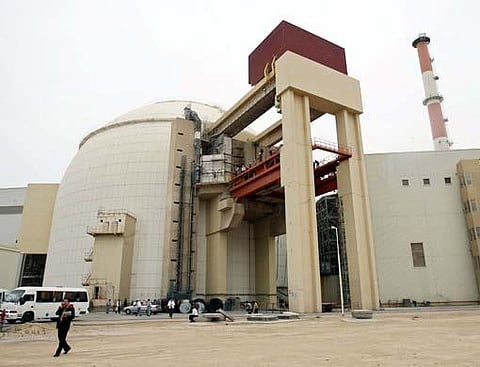Iran reactor to start in August
Official: Sanctions will not stop launch

Moscow: Russia's top nuclear official says that work on Iran's first nuclear plant is on schedule and the reactor will start operation by August.
Rosatom chief Sergei Kiriyenko said on Wednesday that possible international sanctions being drawn up against Iran will not impede the launching of the reactor in Bushehr.
Work on the plant began over 35 years ago by a German company that eventually abandoned the project after the Islamic revolution in 1979.
Russia agreed to complete the project in the 1990s but has delayed the launching due to numerous problems.
Nuclear deal
Meanwhile, Russian Foreign Minister Sergei Lavrov called on Iran yesterday to send its proposal for a nuclear fuel swap deal to the UN atomic watchdog as soon as possible, Interfax news agency reported.
"We call on Iran to send its proposal to the IAEA (International Atomic Energy Agency) as quickly as possible so that the scheme for the fuel exchange can be agreed," Lavrov was quoted as saying about the deal while on a visit to Italy.
Lavrov said discussions about the deal, coaxed out by Turkey and Brazil and based on one brokered by the IAEA last October, should not hinder discussions in the Security Council about a new set of sanctions against the Islamic Republic.
"This should not interfere with discussions in the U.N. Security Council," Lavrov was quoted as saying, adding he hoped for a consensus in the world body.
Diplomats in Vienna said on Thursday that Iran had not yet provided the IAEA with details of the proposal, which the West sees as a way to minimise the risk of Tehran turning uranium enrichment to producing atomic bombs. Iran has said it will respond to the IAEA by May 24.
Iran rejects Western suspicions that its escalating uranium enrichment work is meant to developing nuclear weapons capability. It says its atomic ambitions are limited to the peaceful generation of electricity.
The United States on Tuesday handed the Security Council a draft resolution that would expand sanctions against Tehran over its refusal to suspend uranium enrichment and open up entirely to IAEA inspections and investigations.
Iran has dismissed the draft resolution, saying the measures were unlikely to be approved and would not break its economy even if they were implemented.
Sign up for the Daily Briefing
Get the latest news and updates straight to your inbox



